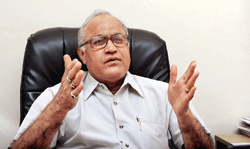Bankruptcy code a game changer :BJP economist Jagadish Shettigar
 M. CHENNA NAGRAJ
M. CHENNA NAGRAJNEW DELHI : Noted economist and former BJP think tank today felt that the insolvency and Bankruptcy code 2016 brought by the four year Narendra Modi government is the game changer decision while it has to do extra work to do in protecting interests of the rural economy.
Talking to Newstrack24x7.com on the occasion of completion of years of the Modi government, Mr Jagadish Shettigar, a former Chairman of the party’s economic cell listed demonetisation and the rolling out of the Goods and Services Tax were the other major measures undertaken by the government which had inflicted ‘short term pains’ on the national economy.
Mr Shettigar, currently teaching at Birla Institute of Management in Greater Noida,Said that the bankruptcy code had ‘positive impact’ on the bulging Non-Performing Assets that was dogging the banking sector for a long time. Following the acceptance of the bankruptcy code, the lender banks were empowered to initiate proceedings when they felt things were going out of hand. The Reserve Bank of India (RBI) had prepared a list of dozen corporate entities including Adani and Anil Ambani falling in the the stressed companies had started to repay their loans after initiation of proceedings against defaulting companies. This is a new and healthy trend of fear of law triggered by bankruptcy code, he reasoned.
The code, Mr Shettigar, who was also a key member in the Prime Minister’s Economic Council said had taken care of the concerns of the companies who were unable to fold up when things were going wrong but were compelled to pay the labour if their numbers exceeded 100 even without any work allocations. However there were states who had this number at 300.
On the demonetisation of high value currencies (Rs 500 and Rs 1000), he said that despite all the discomforts, the common man had backed the government to the hilt, as seen in the results of the assembly elections in Uttarakhand and Uttar Pradesh that were held after the demonetisation. Is it not a good sign that 99 percent of the new currency was in the banking system. The Income Tax authority is working to ascertain what portion of 15.94 lakh crore was ‘black’ as the money was traced to the holders of currency outside the formal system.
The one percent currency that could not make it to the banks was basically fake notes and corruption proceeds for obvious reasons. It dealt crippling effect on stone pelting in Kashmir while choking funds for the extremists of the left wing. Real estate was one other sector that saw impact because of demonetisation. The prices of properties had come down across the country which was good for the buyers.
The newly created Real Estate Regulation Authority (RERA) had laid tough conditions for protecting interests of home buyers. It would be difficult for the construction company to divert funds besides limiting the receipts to 10 percent at the time of booking. Further funds were linked to the actual progress in the project. The NDA government had taken care of the concerns of the poor and the needy be it rolling of subsidies on food grains, gas cylinders in the digital form eliminating delays and leakages.
The newly created Real Estate Regulation Authority (RERA) had laid tough conditions for protecting interests of home buyers. It would be difficult for the construction company to divert funds besides limiting the receipts to 10 percent at the time of booking. Further funds were linked to the actual progress in the project. The NDA government had taken care of the concerns of the poor and the needy be it rolling of subsidies on food grains, gas cylinders in the digital form eliminating delays and leakages.
On the GST and its teething problems noticed in its implementation, Mr Shettigar said people blamed the deceleration in the economy to demonetisation and the GST forgetting the external aspects like the economic conditions in the United States of America, European Union and Japan. When things have eased in their economies, Indian exports too was seeing growth.
On the petroleum scenario, Mr Shettigar said the prices were up because of the apprehension of a possible war between US and North Korea and with Iran. Many countries were storing fuels for difficult days ahead. The impact was felt in our domestic prices on petrol and diesel. There was no doubt that the prices had overstepped line of concern but the central taxes were not the sole reason for current status. The coffers of the States were bulging for example there was a 30 percent jump in Karnataka, 45 percent in Maharashtra. Delhi saw an a increase of Rs 1.2 crore a day while Tamil Nadu’s oil revenues went up by Rs 9.5 crore a day.
The other reason was that the Rupee value had gone down albeit marginally compared to last year had added to the woes. The best solution is to bring petroleum products under GST but it could happen only with consensus of States. It would be improper for the centre to burden the Oil Market Companies in the public sector. There were also companies like Reliance and Essar in the private sector, he remarked.

